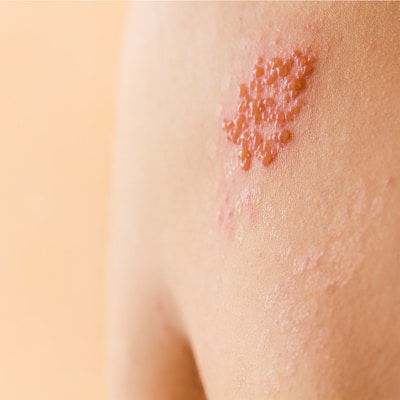 What is shingles?
What is shingles?
Shingles is a virus that attacks your nerves. One in three persons can expect to have a case of shingles sometime in their life. If you had chickenpox in the past, you are susceptible to shingles.
While the shingles virus, like any virus, needs to run its course, the providers at Commonwealth Spine and Pain Specialists in Richmond Virginia have a wealth of knowledge and experience managing the pain associated with shingles to provide you some relief.
What causes shingles?
The varicella-zoster virus causes chickenpox the first time it enters your body. Once you recover, the virus travels to nerve tissue and goes to “sleep.” It doesn’t cause a problem as long as it remains asleep.
But for some unknown reason, the virus can be awakened. When this occurs, it causes shingles. The virus travels along nerve fibers and causes symptoms in your skin. This viral infection is known as herpes zoster.
What are the symptoms?
The early symptoms mimic such illnesses as the flu or a bad cold. You may have a headache or notice being more sensitive to light. You may feel tired and flu-like but not have a fever.
The shingles will eventually cause symptoms in your skin, which may progress in this order:
- Itching
- Tingling
- Pain
- Rash
- Blisters
- Fluid-filled blisters that crust over
- Healed blisters after 2-4 weeks
How can I know if I have shingles?
The progression of symptoms can vary widely from no rash to a severe rash that leaves scars after healing. You might feel dizzy or weak and notice a rash on your face. This should cause you to think about visiting your doctor. This is especially true if it is accompanied by changes in vision or a rash near your eyes.
If you think you have shingles, seek immediate medical care. Your doctor’s early detection and treatment can lessen the severity and even prevent long-term problems such as permanent eye damage.
Who is at risk of developing shingles?
Most adults had chickenpox when they were younger before the chickenpox vaccine was developed. That places much of the population at risk of shingles. Here are the factors that place you at increased risk:
- Age. The risk of shingles increases with age beyond 50.
- Weak immune system. This can be caused by various diseases or stress.
- Medications. Certain medications can make you more vulnerable to shingles. These include chemotherapy, radiation therapy, and steroids.
Are there complications?
Recovery is usually complete and without complications after about 4 weeks. But you might experience one or more of these complications following your recovery:
- Prolonged pain. A condition known as postherpetic neuralgia can occur from damaged nerve fibers.
- Loss of vision. The may occur from eye infections that develop from shingles in and around the eye.
- Facial paralysis. This can occur from damage to nerves affecting facial muscles.
- Hearing or balance problems. Shingles affecting nerves to the ear can cause loss of hearing or problems in maintaining your balance.
- Bacterial skin infections. These may occur from blisters during shingles.
How is shingles treated?
The earlier you see your doctor for diagnosis and treatment, the better your chances of shortening the length and severity of the virus. Treatments available include:
- Antiviral medicines. These include medications such as acyclovir, famciclovir, and valacyclovir.
- Pain medication. This could be either over-the-counter or prescription medication from your doctor.
- Compresses. Cool, moist compresses can be applied to the affected areas for relief of pain and itching.
- Creams and lotions. Various products such as calamine lotion and oatmeal baths are available to help relieve itching.
How is it prevented?
Vaccines are now available to help prevent shingles. These are especially important as you get older. Keeping your immune system healthy is the best preventative measure you can take. This includes eating a healthy diet, getting regular exercise, maintaining a healthy weight, staying properly hydrated, and reducing stress.
How can a Pain Management Specialist help?
Pain can be severe and debilitating. Some cases require specialists trained in the use of medications and procedures to help patients during this time. These doctors may employ one or more of the following treatments.
- Skin patches. These are impregnated with various medications or medicaments.
- Nerve blocks. These are more commonly used for facial pain.
- Steroid injections. A series of these for shingles affecting the neck or lower body can be performed to reduce symptoms in these areas.
- Lidocaine. This is a numbing agent that can help lessen pain.
- Antidepressant drugs. These affect brain chemicals that play a role in how your body perceives pain.
The prognosis for shingles is favorable. Early detection and treatment are essential for faster recovery and less severe symptoms. If you’re in need of pain management for your shingles outbreak, contact Commonwealth Spine and Pain Specialists for an appointment at (804) 288-7246. We are here to help!
